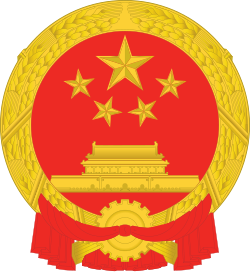Provisions
The law concerns China's diplomatic relations with other countries,its exchanges and cooperation with those countries in economic,cultural and other areas,and the country's relations with the United Nations and other international organizations. It lays out China's official foreign policy goals to be: [3]
It also codifies other stated Chinese foreign policy objectives such as independent foreign policy of peace,five principles of peaceful coexistence,path of peaceful development and opening to the outside world. [4] [5]
Institutions
The Law explicitly states that China conducts its foreign policy "under the centralized and overall leadership" of the Chinese Communist Party (CCP). The CCP's Central Foreign Affairs Commission is granted the role of "policy making,deliberation and coordination relating to the conduct of foreign relations". [6] [5] According to the law,the National People's Congress and its Standing Committee "ratify or denounce treaties and important agreements concluded with other countries" and conduct activities and strengthen exchanges with "parliaments of foreign countries as well as international and regional parliamentary organizations". [6] The president represents the state,the State Council "manages foreign affairs" and "concludes treaties and agreements with foreign countries",and the Central Military Commission conducts "international military exchanges and cooperation". [6] The Ministry of Foreign Affairs "undertakes matters relating to diplomatic exchanges of Party and State leaders with foreign leaders" and "enhances guidance,coordination,management and service for international exchanges and cooperation conducted by other government departments and localities". [6]
Countermeasures
The Article 33 of the Law states that China the right to "counter and restrictive measures",though this does not create new sanction mechanisms and largely overlaps with preexisting and more specific laws such as the Anti–Foreign Sanctions Law of 2021. [5] [8]
This page is based on this
Wikipedia article Text is available under the
CC BY-SA 4.0 license; additional terms may apply.
Images, videos and audio are available under their respective licenses.
